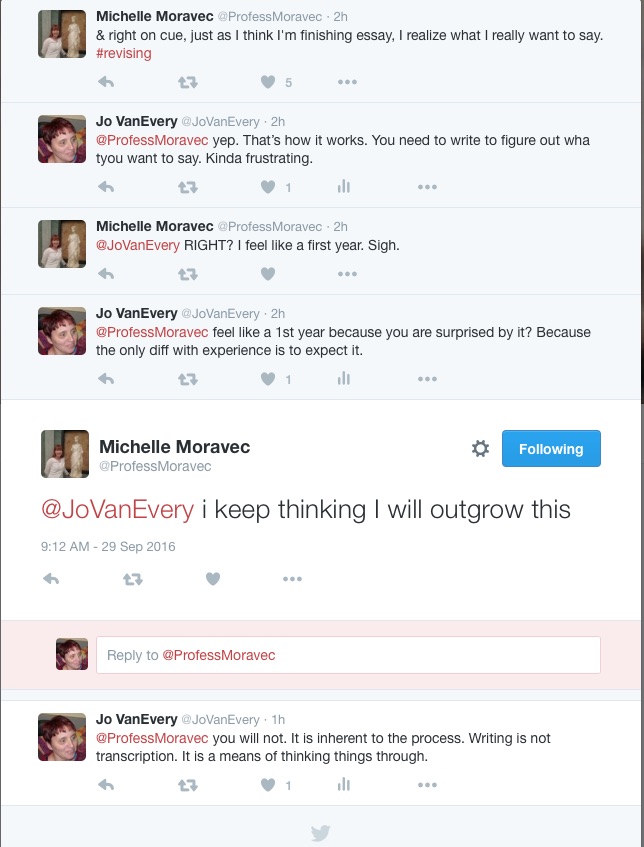Inspired by a conversation on Twitter:
I’m sure @ProfessMoravec is not alone. In fact on the same day another friend shared something similar on Facebook, about that stage of the writing process where you go back to the abstract you submitted to see how different the article you wrote really is. Both of these people are experienced academic writers. They are not novices.
I also listen to a podcast by a fiction writer I know, in which she mentions that she’s just finished the first draft of her latest novel and was frustrated by not knowing how the novel is going to end. Then she remembered that she never figures that out until she’s finished the 2nd draft. This is her 16th novel.
The difference between novice writers and experienced writers is that experienced writers know how messy the process is and have figured out how to work with that. Notice how Michelle Moravec’s thread starts with “just on cue…”.
As an experienced writer she may find it frustrating that this happens, but she recognizes that it always does. She bitches about it publically. I (and possibly other friends) reassure her that it’s normal and frustrating. And then she gets back to her writing and revises what she wrote.
Writing is a cognitive process
Just like light is both a wave and a particle, writing is both a means of communicating your ideas to others and the way you work out what you want to communicate.
You have to write what Anne Lamott famously called a “shitty first draft”. Experienced writers recognize that being efficient is writing that shitty first draft without fighting yourself all the way through it. Experienced writers know that the efficient process is bitching briefly about how frustrating this process is and then getting on with revisions.
Novice writers take a lot of time beating themselves up about how shitty that draft is. Or get writer’s block because they refuse to write shitty prose and the well crafted argument written in beautiful prose just won’t come out of their fingertips. Novice writers think that these things mean they just can’t do it, or they are stupid, or that they don’t have anything worthwhile to say.
Experienced writers know that writing the incoherent thoughts down enables them to revise those thoughts into coherence. In fact, in Episode 15 of Rachael Herron’s How Do You Write? podcast, Chris Baty said that he never reuses any of the prose from his first draft. He writes it fast and rereads and refers to it but starts his second draft by focusing on the story arc (he writes fiction).
It’s a great idea. Write a fast first draft to figure out what you want to say and then use that to create a structure and sketch out the argument. Write a new draft to that structure. Then revise that 2nd draft into better prose. Definitely worth a try. And absolutely an experienced writer strategy.
What parts of the writing process do you think you’ll outgrow?
This is a genuine question though you don’t have to share your answer. Write it down for yourself though. And then ask yourself how you could write more effectively by accepting this is just how it is.
And if you’d like to share, the comments are right there. It will help others to see that they are not alone.
Because the other thing experienced writers share is frustration and shame that they are experienced writers and still learning this stuff.
While the frustration may be inevitable, the shame is not required.
Enjoy your writing!
Related Posts:
Are you treating writing as real work?
Motivation and accomplishment in your writing practice
Making Decisions about your writing
This post has been lightly edited since its original publishing date and was added to the Spotlight On: Imposter Syndrome in November 2023.









